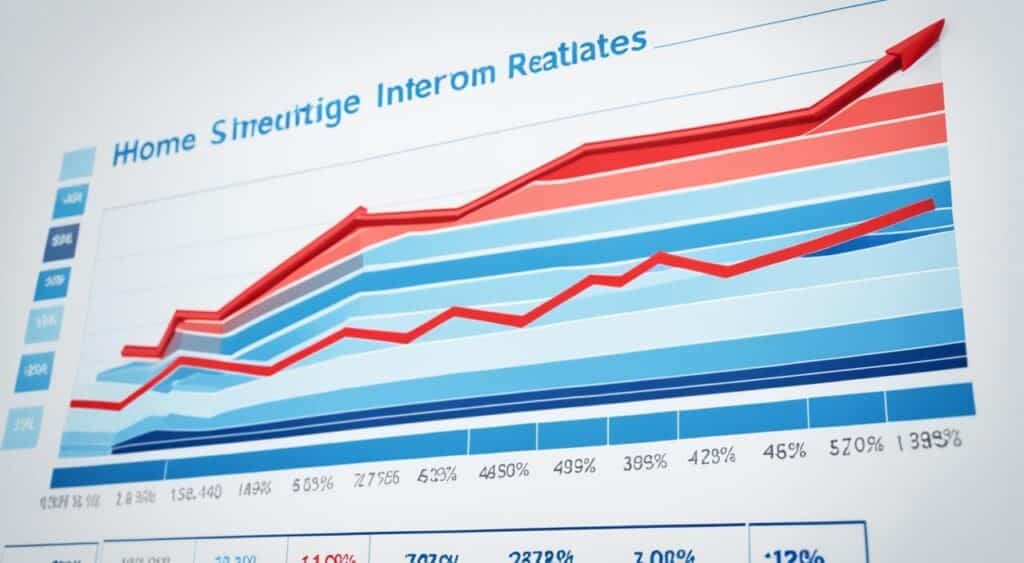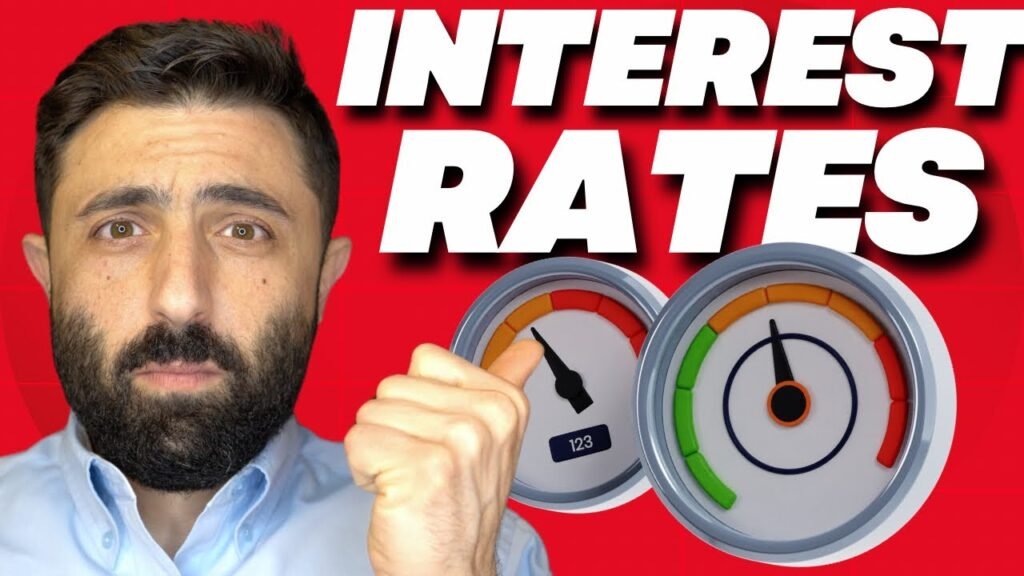Understanding how interest rates affect home loans is crucial. There are mainly two types of mortgage loans—fixed rate and adjustable rate. It’s important to grasp how interest rates work. This knowledge allows you to make wise choices for your mortgage. You might need to choose between a fixed-rate mortgage and an adjustable-rate mortgage (ARM). Or, you could be thinking about refinancing out of an ARM.
The interest rate is the extra amount a lender charges a borrower. It’s for the privilege of using the lender’s money. These rates depend on many things, including the economy and your financial health. Understanding interest rates is key to making good decisions in the mortgage market.
Key Takeaways
- Understanding interest rates is crucial for making sound mortgage decisions, such as choosing between a fixed-rate and adjustable-rate mortgage.
- Interest rates are determined by a variety of factors, including the state of the economy and the borrower’s personal financial situation.
- Mortgage loans come in two primary forms—fixed rate and adjustable rate—with hybrid options and derivatives of each.
- Choosing the right mortgage type can have a significant impact on your monthly payments and the total cost of the loan over its lifetime.
- Staying informed about interest rate trends and how they affect the housing market can help you time your home purchase or refinance effectively.
Understanding Interest Rates and Mortgage Loans
To understand home loans, you need to get how interest rates work. These rates really matter. They affect how much you pay each month, what you can afford, and the total cost of your mortgage loan.
Key Factors Determining Interest Rates
Many things impact the interest rate on a mortgage loan. It’s not just the general economy; your own situation matters too. For example, when inflation goes up, central banks like the Federal Reserve may raise interest rates. This makes borrowing money more expensive home mortgage loans include principal and interest include principal and interest refinance rates refinance rates first mortgage.
Fixed-Rate vs. Adjustable-Rate Mortgages
There are two main types of mortgage loans: fixed-rate and adjustable-rate (ARM). With a fixed-rate mortgage, your interest rate doesn’t change. But with an ARM, it can go up or down, usually based on a set formula.
The Mortgage Production Line
The mortgage industry works in three main steps. First, there’s the mortgage originator (lender) who gives you the loan. Then, the aggregator combines these mortgages into securities. Finally, the investor buys these securities. The price they pay affects the interest rates offered to you.
| Mortgage Loan Type | Interest Rate | Advantages | Disadvantages |
|---|---|---|---|
| Fixed-Rate Mortgage | Fixed for the life of the loan |
|
|
| Adjustable-Rate Mortgage (ARM) | Fluctuates based on an index and margin |
|
|
Getting how interest rates work, knowing the two main mortgage types, and learning about the mortgage industry are key. It helps you choose your home loan smartly.
The Role of the Federal Reserve

The Federal Reserve (the Fed) sets interest rates. It decides the federal funds rate too. This rate affects how much banks charge each other for very short loans done overnight. So, it changes many other interest rates in the country. This includes mortgage rates.
Inflation and Bond Yields
The Fed often raises interest rates to fight inflation. But, this can slow down how much businesses grow, and how many people they hire. Raising rates can also mean higher bond yields. This directly affects mortgage rates and how much homebuyers or people refinancing their homes pay each month.
Monetary Policy and Long-Term Interest Rates
The Fed’s choices on monetary policy can greatly change long-term interest rates. This includes rates for mortgage loans. When the Fed raises rates to control inflation, mortgage rates might go up. That can make buying a home or refinancing cost more for homeowners and first-time homebuyers.
Fixed Interest Rate Mortgages

Fixed interest rate mortgages offer a stable choice for homeowners. The rate stays the same for the whole loan life. This means your monthly payments won’t change, helping you budget better.
This is great for those buying a home or refinancing. Instead of worrying about rate changes, you can focus on your home.
Relationship with Treasury Bonds
The prices of mortgage-backed securities (MBS) follow U.S. Treasury bond prices closely. Especially the 10-year note. When Treasury bond rates go up, so do mortgage rates.
So, what happens in the Treasury bond market affects mortgage rates. That means the cost of borrowing money to buy or refinance your home can change. Be ready for this when planning your finances.
Forecasting Fixed Mortgage Rates
Watching U.S. Treasury bonds can give clues about future mortgage rates. If Treasury bond rates increase, so might your mortgage rate. Your monthly home payment could go up.
But if Treasury bond rates fall, the situation could be different. Mortgage rates might become more attractive, lowering your home loan cost. This could benefit borrowers and homeowners.
Knowing how mortgage rates and Treasury bonds are linked is vital.
It helps both specialists and consumers pick the best loan options. Keeping an eye on financial trends can be very useful. It lets homeowners manage their mortgage payments well.
Adjustable-Rate Mortgages (ARMs)

Adjustable-rate mortgages (ARMs) are different from fixed-rate mortgages. They have interest rates that change over the loan’s life. The rate can change monthly, every six months, or even less often. It all depends on the mortgage terms. An ARM’s rate is based on an index value that can vary, plus a fixed margin. This is the fully indexed interest rate.
How ARM Rates are Calculated
An ARM’s interest rate uses an index like the SOFR, U.S. Prime Rate, or a Treasury Bill. The index value is the basis. Then, the lender adds a fixed margin, usually 2-3%, to find the total rate. If the index is 3% and the margin is 2.5%, the rate becomes 5.5%.
Forecasting ARM Rate Changes
It’s hard to predict changes in adjustable-rate mortgages because index values can change. These changes happen due to market conditions and the Federal Reserve’s decisions. Those with ARMs need to watch economic factors affecting the index. They also need to keep an eye out for any margin changes from lenders. Doing so helps manage payments or refinance for a better rate.
Impact of Rates on the Housing Market

The interest rate really matters to the housing market. When interest rates go up, things slow down in the housing market. Why? Because buying a home gets more expensive. So, fewer people can afford to buy. When rates drop, spending on homes becomes cheaper. Then, more people want to buy houses. This can make home prices go up.
Higher Rates and Market Slowdown
If interest rates go up, getting a home loan pays off more. This is often done to keep prices from rising too fast. Sadly, it might mean some people can’t afford to buy their first home. It’s tougher for people with lower credit scores, too. Why? Because their loan payments will be higher. Less buyers can lead to a slow market. Prices could even drop.
Lower Rates and Increased Demand
But, if interest rates down, financing a home gets cheaper. This is good news for both new buyers and those looking to change homes. More people will try to buy, which means more competition for houses. So what happens? Home prices often go up because everyone’s trying to buy the same house.
It’s key for anyone in the housing market to understand interest rates. Knowing how they affect the market can help you make wiser choices. Maybe you’re thinking of buying, selling, or changing your loan. Stay up to date on what rates are doing. This knowledge can save you money.
Home Loans and Interest Rate Hikes
The Federal Reserve is increasing interest rates to fight inflation. This action is heavily affecting home loans. Interest rates are rising, making mortgage loans more expensive. This change impacts homebuyers and those with adjustable-rate mortgages (ARMs) significantly.
Rising Monthly Payments
Rising rates mean a $300,000 mortgage could jump by $358 a month. Over time, this adds up to over $128,000 more in total interest paid. Such increases are making it hard for people to cover their monthly mortgage payments.
Qualifying for a New Mortgage
Higher interest rates are also affecting those seeking new loans. This situation is particularly tough for first-time homebuyers and those wishing to refinance. Lenders are being stricter, looking closely at credit scores and debt-to-income ratios.
This makes it harder for many borrowers to get a mortgage loan. For them, buying or refinancing a home is now more challenging.
In the face of ongoing challenges from growing mortgage rates, staying informed is key. It’s vital for homebuyers and homeowners to work closely with experts. They should explore the best home loan options for their financial situation.
Strategies to Save on Mortgage Costs
With interest rates on the rise, finding ways to reduce mortgage costs is crucial. Here are some tips to help:
Larger Down Payment
Putting down more money can mean you borrow less. This lowers your monthly payments and the total interest you pay. When you put down 20% or more, it’s possible to skip private mortgage insurance (PMI). This move cuts your costs even more.
Also Read: How To Optimize Loan Repayment Strategies For Success
Shorter Loan Terms
Consider a shorter loan term, like 15 years instead of 30. Yes, you’ll pay more per month. But, the interest you save over the loan’s life can be huge. You might save thousands this way.
Shopping Around for Rates
Lenders offer different rates, so always compare. Shop around to snag the best rates and save big over time. Thousands can be saved this way.
Improving Credit Score
How good your credit score is affects your mortgage’s interest rate. Boost your score by reducing debt, fixing credit report errors, and paying on time. A higher score means a lower rate and less cost for you.
FAQs
Q: How do interest rates impact home loans?
A: Interest rates play a crucial role in determining the cost of borrowing for a home loan. When interest rates are low, borrowers can secure loans at more affordable rates, resulting in lower monthly payments. Conversely, higher interest rates lead to increased borrowing costs, resulting in higher monthly payments.
Q: How can I calculate my monthly mortgage payments?
A: You can use a mortgage calculator to estimate your monthly mortgage payments based on factors such as loan amount, interest rate, loan term, and down payment amount.
Q: What is refinancing and how does it work?
A: Refinancing involves replacing an existing mortgage with a new one, typically to secure a lower interest rate, lower monthly payments, or access home equity. It can help borrowers save money in the long term.
Q: What is home equity and how can I utilize it?
A: Home equity refers to the difference between the current market value of your home and the outstanding balance on your mortgage. You can utilize home equity through options like a home equity line of credit (HELOC) or a cash-out refinance.
Q: How do I choose the right mortgage lender?
A: To select the right mortgage lender, consider factors such as interest rates, loan options, customer service, and overall reputation. It’s essential to compare offers from multiple lenders to find the best fit for your needs.
Q: What are some common loan options available for home financing?
A: Some common loan options for home financing include conventional loans, FHA loans, VA loans, jumbo loans, and various loan programs tailored to different borrower needs.
Q: How does mortgage insurance impact my loan?
A: Mortgage insurance is typically required for loans with a down payment of less than 20%. It provides protection for the lender in case the borrower defaults on the loan. Borrowers can choose to pay mortgage insurance or explore options to waive it depending on their financial situation.
Source Links
- https://www.rocketmortgage.com/learn/how-rising-fed-interest-rates-affect-home-buyers
- https://www.investopedia.com/mortgage/mortgage-rates/housing-market/
- https://www.experian.com/blogs/ask-experian/how-rising-interest-rates-affect-new-mortgages/

